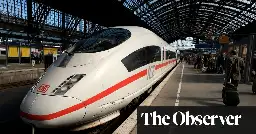‘It’s the same daily misery’: Germany’s terrible trains are no joke for a nation built on efficiency
‘It’s the same daily misery’: Germany’s terrible trains are no joke for a nation built on efficiency

‘It’s the same daily misery’: Germany’s terrible trains are no joke for a nation built on efficiency

Deutsche Bahn’s once-admired service has descended into chaos. Whether decades of poor investment or the company’s unusual structure is to blame, it’s a huge headache for a coalition trying to meet climate goals
The sleek high-speed train is 10 minutes behind schedule when it slides into Cologne’s main station before continuing its journey north to Dortmund. The delay is now such a common occurrence that the train manager does not even both to mention it to disembarking passengers.
In late afternoon on an unremarkable weekday in this western German city, holidaymakers are hauling suitcases through the station, workers are commuting home, and the late arrival of Deutsche Bahn’s IC 118 from Innsbruck is no surprise.
It does cause annoyance, though: a glance at the departures and arrivals board prompts one middle-aged man carrying a backpack to swear loudly as he enters the station.

